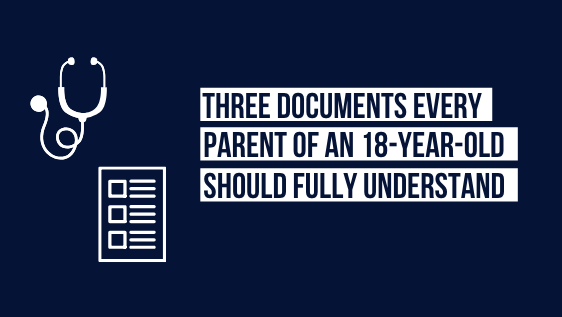My oldest child will be going away to college this fall. She is 18 years old and although I still see her as the little girl bouncing on my knee, she’s legally an adult. As parents, it’s easy to forget that when our children turn 18, they magically become fully emancipated legal adults. Your 18-year-old now has full power and legal authority to make their own decisions, enter into contracts, open accounts, join the Columbia House Record of the Month club, join the army, or get a tattoo. Most importantly, you are no longer their legal guardian, which means that, if God forbid, there should be some sort of medical emergency, you would not have the legal right to direct their care or even get information about their condition. Under federal law, medical providers are strictly prohibited from providing any information about a patient’s medical care to anyone (no exception for parents) without prior authorization from the patient. HIPPA requires this authorization to be in writing; that means if your child gets injured in a car accident and they are 18 or older, hospitals may not even be willing to tell you whether they are even a patient.
We usually think of Medical Directives and Health Proxies as something we prepare for our parents or grandparents. These are legal documents that allow someone to make medical decisions for someone else – usually but not always – in the event they are incapacitated or unable to make their own decisions. We really don’t think about the very real possibility that our freshly minted adult children could benefit from these types of documents as well. This information is not only important for parents getting ready to send their child to college, but also for any parent of a young adult. There are three legal documents that are worth thinking about having our adult children execute.
General Durable Power of Attorney
The first is a General Durable Power of Attorney, in which your child would be granting you the power to act on their behalf in pretty much any capacity you choose. You can make this as broad or specific as you want. It can let you make and break contracts on behalf of your child, write checks, pay bills, handle finances – pretty much anything that needs to be done. This can be handy if you need to talk to the cable provider across the country to cancel service that your child took out in the rental house at college, or if you need to speak to the landlord or school. Even though you may be the one paying tuition, the school reports grades to the students and leaves it up to them as to whether they want to share them.
Medical Directive/Health Proxy
This document allows you to make medical decisions for your child. In the event of an emergency, doctors and hospitals will provide medical treatment and are required to do what they can to keep the patient alive. However, medical treatment for a complicated condition can have lots of layers and nuances. As a parent, you may want to be informed and involved in this process. Without a Health Proxy, the treating doctors and nurses won’t even talk to you. In fact, it would be considered a HIPPA violation if they did.
Many states or state bar organizations have forms they make available on their state websites with Medical Directives and Health Proxies that can be filled out. Below is a link to the health proxies for the state of Missouri and the state of New York.
If your child is going to school in another state, it may be worth taking a look to see if that state offers a specific form. Our state approved Medical Directive for Missouri has language that it is intended to be valid in all jurisdictions and if the laws of any particular state invalidate any portion of the medical directive, then the rest of the directive is still valid. While it may not be necessary to have a health proxy from your home state and the state your child is living in, if one is readily available that has been approved by the state, it could make your life easier in the event of an emergency.
Medical Authorization
A medical authorization is exactly what it sounds like: It’s an authorization from your child that will allow you to get a copy of your child’s medical records. The authority to get records is probably already covered by the health proxy, however, HIPPA has very specific requirements as to what has to be set out in an authorization for information to make it valid. They are used to seeing HIPPA compliant medical authorizations which covers them from liability for releasing records. Rather than argue with them about whether your Health Proxy is HIPPA compliant, it is just easier to have your child execute a separate authorization. In many states, including our home state of Missouri, an authorization to get records does not include the authorization to speak with the doctor and must be specifically included.
We have watched our babies grow into toddlers, teens, and now young adults. As proud as we may be, we know that those prefrontal cortexes are still developing and they may need some help with big decisions as they make the transition into adult life. In the event of a crisis, you don’t want to be left dangling in the dark with doctors across the country telling you they can’t talk to you. Take a minute to think about whether it makes sense to have your teen execute these documents so you have them ready to go in the event of an emergency. Here is a great article from the National Law Review about the importance of having these documents in place:





